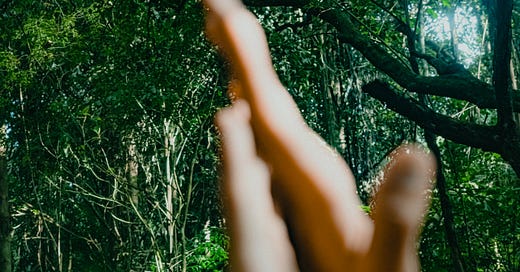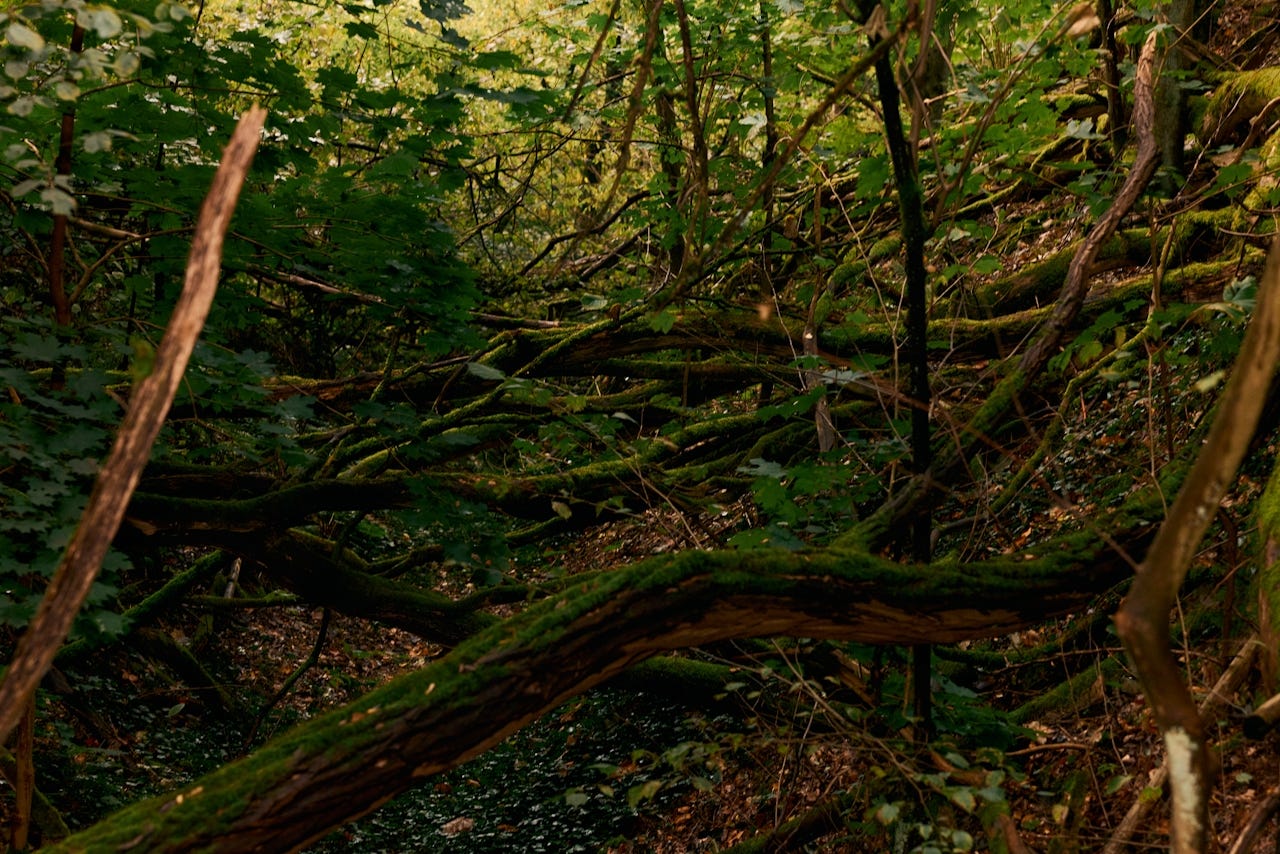What Systems Thinking is Missing
How Systems Feeling accesses another intelligence between us.
When I first started writing about awe as a gateway to changemaking, I noticed something curious. The moments that moved people most deeply, whether it be standing before a vast mountain range, witnessing an act of unexpected kindness, or being transported by the depths of a piece of music, these weren't just personally transformative. They seemed to shift something fundamental about how people understood their place in the world.
Awe is one of the few emotions that naturally moves us from "me" to "we." Even when experienced alone, awe momentarily dissolves the boundaries of the individual self and connects us to something larger. It's a fast-track to feeling part of something beyond ourselves - whether that's the natural world, humanity, or the cosmos itself. In those moments of awe, we don't just think about interconnection; we feel it viscerally, embodied, undeniably real.
This connection between awe and our sense of belonging to something larger led me to explore what I call "Systems Feeling", that embodied experience of collectively sensing our interconnectedness with the larger web of relationships that constitute our world. Awe, it turns out, can be a doorway to remembering our capacity for collective sensing and responding.
I want to be clear that "Systems Feeling" is simply my way of naming and exploring something that has existed long before any of us were born. I'm not inventing anything new. I'm joining a conversation that stretches back through generations of thinkers, practitioners, and cultures who have understood that our individual wisdom is always incomplete without our collective sensing. From indigenous knowledge keepers like Anishnaabe Elder Jim Dumont, to systems theorists like Gregory Bateson, activists like adrienne maree brown, to researchers studying collective intelligence, many have pointed toward this capacity for sensing together. My hope is that by offering this particular framing - Systems Feeling - I can contribute to connecting dots, making that wisdom accessible and actionable for our current moment. This is about remembering and re-languaging something that has always been available to us, not creating something that didn't exist before.
What I Mean by "Systems"
Before we go deeper, let’s take a step back. A system is simply a collection of interconnected parts that work together as a whole. Your body is a system - your heart, lungs, brain, and nervous system are all interconnected. A forest is a system - trees, soil, fungi, animals, and water cycles, all interdependent. Our economy is a system, as is our climate, our families, our democracy, and our global food web.
Systems thinking is the practice of seeing these connections rather than just isolated parts. Instead of looking at pollution as a 'problem’, systems thinking helps us see how it connects to so many systems, industrial practices, consumer habits, political policies, and even cultural values. One system connects to another, and another…
The key insight of systems thinking is that the whole is greater than the sum of its parts. New properties emerge from the relationships between elements that you can't understand by studying the parts in isolation. You can't understand a forest by just studying individual trees, just as you can't solve climate change by only looking at carbon emissions. Systems are messy, complex and nauseatingly entangled.
When Systems Break Down
Our greatest challenges, from climate breakdown to social polarization to mental health crises, aren't just ‘problems’. They're symptoms of our collective inability to sense into the health of these systems and respond appropriately.
Think about climate change. We have the data. We understand the science. We know what needs to be done. We’ve crafted stories. We’ve built solutions. But we're struggling to act collectively. We've lost our ability to feel together into what the Earth system is telling us, and where we can head. We experience the world as separate individuals making separate decisions, rather than as part of an interconnected living system that we can sense into and respond to collectively.
The same pattern shows up everywhere. In our organizations, we often make decisions in silos, optimizing for individual or departmental success while overlooking the broader impact of those decisions on the larger organizational ecosystem. In our communities, we retreat into ideological bubbles with those who believe what we do, losing our capacity to sense into the social fabric.
What sociologist Hartmut Rosa calls "alienation" - a particular mode of relating to the world of things, to people, and to one's self in which there is no responsivity, i.e., no meaningful inner connection, has become our dominant way of being. We exist together but it is rare to experience the spark of connectivity with another person, let alone the interconnectivity of an entire system. We've become disconnected not just from nature, but from each other and from our ability to sense collectively into what our larger systems need.
The Indigenous Foundation
This disconnection from feeling through systems wasn’t inevitable or natural. Indigenous cultures worldwide have maintained collective sensing and decision-making, despite modernity creating systems of extraction and exploitation that treat relationships as resources to be optimized rather than living connections to be tended.
The Haudenosaunee (Iroquois) Seven Generations Principle is a practice of considering the impact of decisions on seven generations ahead. It’s a practice that requires collective sensing into the long-term health of social and ecological systems. The Lakota phrase "Mitákuye Oyás'iŋ" - "all my relations" - reflects a lived understanding that decisions must account for the wellbeing of the entire web of relationships.
These practices represent just the tip of the iceberg. I'm still uncovering the profound depth and diversity of indigenous foundations that offer radically different approaches to collective sensing and systems wisdom.
The Science of ‘Feeling’ within a Collective
Modern neuroscience has validated what indigenous cultures have always known. Research shows that empathic concern via the brain's release of oxytocin, is a trigger for collective action. That empathy reflects the natural ability to perceive and be sensitive to the emotional states of others, coupled with a motivation to care for their well-being.
But this goes beyond individual empathy. When groups of people attune to each other, something remarkable happens. Mirror neurons fire in synchrony. Nervous systems co-regulate. Collective intelligence emerges that no individual could access alone. We begin to sense patterns, possibilities, and needs that only become visible when we feel together into the larger system of which we're all part.
This isn't mystical, it's biological. We are literally wired for collective sensing. Our nervous systems are designed to attune to each other and to our environment in ways that allow us to sense and respond collectively to what's needed. The tragedy is that most of our modern systems actively suppress this capacity.
Systems Feeling isn’t a Product
Here's what I've learned about sharing this work: the moment we try to package it into a methodology or promise a clear path "from A to B," we risk squashing the very thing we're attempting to transmit. Systems Feeling emerges from the quality of relationship and attention we bring to our collective sensing, not from following prescribed steps.
I'm wary of the marketing narrative that says "here's the problem (disconnection, alienation, broken systems) and here's the solution (our program will guide you to connection and wholeness)." This binary thinking of “bad here/good there - we'll take you from one to the other”, is itself part of the fragmentation we're trying to heal.
Instead, this is an invitation to notice and explore. Systems Feeling might sound abstract, but it can show up in practical ways when we create conditions for it to emerge.
When we sense together, when we slow down enough to feel into the larger patterns and needs, we access information that no individual analysis could provide. We can feel when a decision serves the whole or when it optimizes for one part at the expense of others. We can sense into emerging possibilities that haven't yet become visible to rational analysis. We can detect early warning signs of system breakdown before they show up in the "data”.
But this isn't a promise or a guarantee. It's an invitation to experiment, to notice, to remember what we might have forgotten about how to be together in ways that serve the health of our larger systems.
The Path Forward
We can create conditions that support its emergence:
Slowing down enough to feel. Most of our systems prioritize speed and efficiency over sensing and responsiveness. We need practices that help us move at the speed of relationships rather than the speed of transactions.
Creating containers for collective sensing. This means designing events, meetings, decision-making processes, and organizational structures that include space for sensing together before teaching, analyzing or planning.
Learning to work with conflict as information. The health of a system often depends on its ability to hold creative tension rather than rushing to false harmony. In The Fifth Discipline, systems thinking pioneer Peter Senge presented the idea of creative tension, the space that exists between where a system currently stands and where it could go. Rather than viewing this gap as something that needs solving for, according to Senge’s framework, the key lies in preserving this tension instead of rushing to close the gap just to stay comfortable. Disagreement and friction are forms of information about what the system needs. But yes… easier said than done.
Trusting emergence over control. The systems we’re feeling into can feel paralyzingly complex, and especially at this point in time, everything feels like an emergency. Layers of emergencies, in fact.
There are three letters and a world of difference between ‘emergency’ and ‘emergency’. Systems Feeling requires comfort with the ‘not-knowing’, with sensing into what wants to emerge rather than imposing what we think should happen because we are prioritizing immediate action, deadlines, and control, responding to situations as emergencies that demand quick fixes and top-down solutions.
In her book Emergent Strategy, adrienne maree brown explicitly critiques “urgency-based thinking” and the Western impulse to control outcomes, arguing that this mindset leads to manipulation, competition, and disconnection from natural and communal processes.
The Choice Before Us
Can we honor the intelligence that emerges when we feel together?
This isn't about abandoning reason or analysis, it’s about remembering that there are different types of intelligences. It's about integrating them with our capacity for collective sensing. It's about recognizing that our individual wisdom is always incomplete until it's woven together with the wisdom of the whole.
Systems Feeling offers a pathway toward reconnection - not just with nature, but with each other and with the intelligence that emerges when we remember how to sense together.
With kindness and curiosity,
Laura







Phwoarr this is brilliant Laura! Especially love your thoughts on systems feeling not being a product, and the marketing challenges here - this is a tension I struggle with in my work. Such a great piece, I can't wait to hear more about how all this work is evolving!
This was beautiful to read and I love your images. I would be honored if you had use for some images I made called Twilight Sheets. Collaboration is fun. 💛